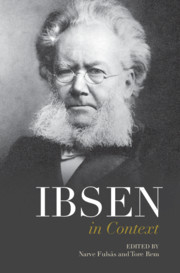Book contents
- Ibsen in Context
- Ibsen in Context
- Copyright page
- Contents
- Figures
- Contributors
- Preface
- Notes on the text
- Chronology
- Part I Life and Career
- Part II Culture and Society
- Part III Scandinavian Reception
- Part IV Internationalization
- Part V Afterlives
- Chapter 24 Biographies
- Chapter 25 Academic Responses
- Chapter 26 American Ibsens
- Chapter 27 Japanese Ibsens
- Chapter 28 Chinese Ibsens
- Chapter 29 Indian Ibsens
- Chapter 30 Mass Media and Popular Reception
- Further Reading
- Index
Chapter 28 - Chinese Ibsens
from Part V - Afterlives
Published online by Cambridge University Press: 23 April 2021
- Ibsen in Context
- Ibsen in Context
- Copyright page
- Contents
- Figures
- Contributors
- Preface
- Notes on the text
- Chronology
- Part I Life and Career
- Part II Culture and Society
- Part III Scandinavian Reception
- Part IV Internationalization
- Part V Afterlives
- Chapter 24 Biographies
- Chapter 25 Academic Responses
- Chapter 26 American Ibsens
- Chapter 27 Japanese Ibsens
- Chapter 28 Chinese Ibsens
- Chapter 29 Indian Ibsens
- Chapter 30 Mass Media and Popular Reception
- Further Reading
- Index
Summary
It is widely acknowledged that Ibsen was one of the most influential foreign authors in China in the twentieth century. His plays were initially introduced by Lu Xun and Hu Shi and then used as a model for the Spoken Drama. In the 1920s, there emerged a group of one-act modern plays composed in vernacular language and featuring heroines following in Nora’s footsteps, later called the ‘departure play’. Cao Yu and Tian Han were among the most prominent Chinese playwrights to consciously learn from Ibsen, especially in the early period of their dramatic careers. Ibsen was also an important source of inspiration for modern Chinese fiction in terms of characterization and theme. In addition, a neologism, ‘Noraism’, was invented to signify the huge impact that Nora once had on the liberation and independence of Chinese women. After the reform and opening-up in the late 1970s, Ibsen experienced another revival in China as his plays began to be widely discussed by new generations of scholars and actively adapted into different theatrical genres. Today, Ibsen still plays an important role in the cross-cultural encounters between China, Norway and the rest of the world.
Information
- Type
- Chapter
- Information
- Ibsen in Context , pp. 248 - 255Publisher: Cambridge University PressPrint publication year: 2021
Accessibility standard: Unknown
Why this information is here
This section outlines the accessibility features of this content - including support for screen readers, full keyboard navigation and high-contrast display options. This may not be relevant for you.Accessibility Information
- 1
- Cited by
